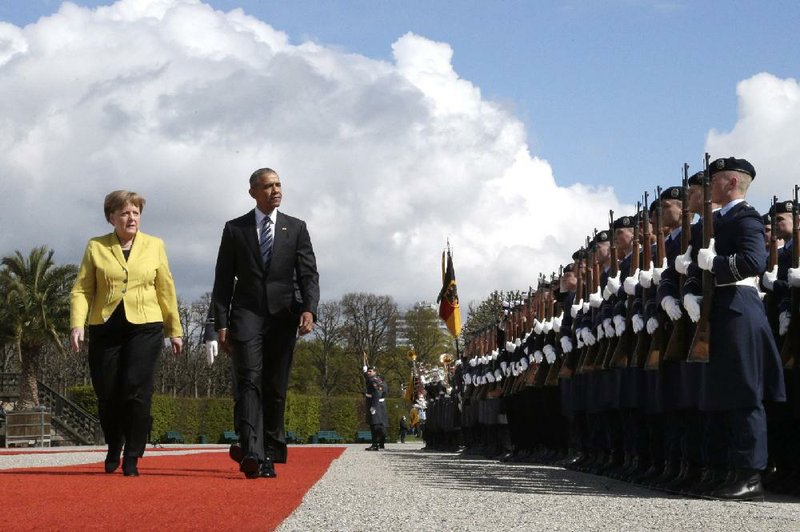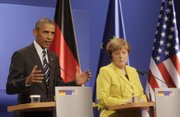HANOVER, Germany -- President Barack Obama said Sunday that he was confident the United States and the European Union would succeed in negotiating a new trans-Atlantic trade deal by the end of the year, saying the benefits of such an agreement were "indisputable."
Obama said images of plants moving overseas and jobs lost created a narrative about trade agreements that "drives, understandably, a lot of suspicion" in places like the U.S. and Germany. But, he added, well-designed trade deals can have greater benefits.
"It is indisputable that it has made our economy stronger," he said. "It has made sure that our businesses are the most competitive in the world."
Obama spoke alongside Chancellor Angela Merkel of Germany at a news conference in Hanover as they prepared to preside over the opening of the world's largest industrial trade fair.
The president's visit to Germany was intended to bolster negotiators seeking to wrap up a trans-Atlantic trade agreement between the U.S. and the EU, an accord that Merkel supports but that is highly unpopular in her country.
Merkel is among Obama's closest and most trusted counterparts, and the president showed eagerness to support her during difficult political times. Merkel has struggled in recent months to confront a surge of migrants and a weakening economy.
Merkel greeted the president at the Schloss Herrenhausen, the former summer residence of the Royal House of Hanover. They stood in front of a line of German troops in gray overcoats and green berets as the national anthems for the two nations played, then returned inside for a private meeting.
Obama said he hoped the trade negotiations could be completed before he leaves office.
"I don't anticipate that we will be able to complete ratification of a deal by the end of this year, but I do anticipate that we will have completed the agreement," he said. Once negotiations are finished, he said, "people will be able to see exactly why this will be good for our two countries."
Obama is pushing to conclude negotiations before he leaves office, so that the "next president can pick that up rapidly and get that done," he told the BBC in an interview broadcast Sunday.
But it's not certain that the next U.S. president would pick up where Obama leaves off on trade. The trans-Atlantic pact has not been a top issue in the campaign to choose Obama's successor. And both leading candidates -- Democrat Hillary Clinton and Republican Donald Trump -- oppose the Asia-Pacific trade pact for its potential effect on American jobs and wages.
Additionally, France and Germany will have elections in 2017 that could also freeze the chances for a deal.
Earlier Sunday in Germany, Obama's commerce secretary, Penny Pritzker, told an audience of 350 business leaders that "we have a rapidly closing window to make progress."
"We must ask ourselves: What is the cost of delay?" she said. "Now is the time for U.S.-German leadership."
She also noted that Europe and the U.S. needed to keep working hard to preserve digital freedom while also heeding privacy concerns.
"If done wrong," she warned, "we put at risk the thriving multibillion-dollar trans-Atlantic manufacturing economy."
Yet when it comes to the U.S., Germans often veer between admiration and scorn. Rarely was that more clear than in the contrasting ways that two groups prepared to greet Obama this weekend.
Undeterred by the scandal caused by Volkswagen's deceit about emissions from its diesel vehicles in the U.S., Germany's export-driven businesses showed off their wares in eager anticipation of the trade fair's opening on Sunday and the first visit to the city by a sitting U.S. president.
Rally against deal
Despite Obama's attempts to rally support for the trade deal, tens of thousands of protesters gathered in Hanover's Opera Square on Saturday. Their goal, as proclaimed in hundreds of banners and chants, was to topple the deal, the Trans-Atlantic Trade and Investment Partnership.
Germany depends on exports for its wealth and on the U.S. for its security. Yet many Germans do not see the free-trade agreement as a good thing.
Monica Orth, 54, a therapist for teenagers who lives in Bonn, is one of many who see the trade pact as a plot by big businesses -- often U.S. ones -- to lower consumer standards, bypass national justice systems and undermine Europe's way of life.
"I don't want Monsanto and Bayer to determine which seeds I eat," Orth said. As two friends nodded in agreement, she added, "Democracy is a really valuable thing, and I don't want big business to take that from me."
At least a dozen other protesters who were interviewed echoed her words. All accused corporations like Monsanto -- the U.S. biotechnology corporation reviled by some for using genetically modified seeds that it says help battle disease -- or the German pharmaceutical company Bayer of trying to force on them products they do not want.
Popular sentiment in Germany often turns against the U.S., which, though admired for its liberty and technical prowess, is also mistrusted by many for its commercial and military dominance.
"Anti-Americanism plays a certain role" in the opposition to the trade accord, said Christian Bluth, a researcher at Bertelsmann Stiftung, a German research institute that recently commissioned a poll suggesting even stronger rejection of the deal than the latest survey by ZDF, a public-service television broadcaster, which found in mid-February that at least half of Germans rejected the proposed trade agreement.
"What I personally find very difficult to understand is why Germans are so full of fears about trade and the future, at a time when they have it good and unemployment is relatively low," Bluth said in an interview.
Anton Hofreiter, a leader of the Greens party who observed Saturday's protest, said anti-American beliefs were not the guiding force of the campaign against the trade pact. Yet he noted that demonstrators were wary that Obama had come to Europe partly to make a quick trade deal.
Michael Froman, the U.S. trade representative, may have stirred those concerns when he told Handelsblatt, a German business daily, on Friday, "We have a unique chance if both sides can show the political will to seal the deal. If we don't manage it now, fears will arise that the deal will never go through."
Negotiations for the trans-Atlantic pact will resume today.
Migrant issue
Obama made a public show of his support for Merkel's handling of the migrant issue at the press conference, saying she was "on the right side of history on this."
Her decision to allow the resettlement in Germany of thousands fleeing violence in Syria and other Mideast conflict zones has created an angry domestic backlash. Merkel recently helped European countries reach a deal with Turkey to ease the flow, but she and the other leaders are now under pressure to revisit it.
Obama said Merkel was "giving voice, I think, to the kinds of principles that bring people together, rather than divide them."
But Obama would not go so far as to back her support for establishing a "safe zone" in Syrian territory, saying that would be difficult to put in place.
"As a practical matter, sadly, it is very difficult to see how it would operate short of us essentially being willing to militarily take over a big chunk of that country," he said. "And that requires a big military commitment."
In comments to Bild prior to his arrival, Obama called Merkel's leadership on the migrant crisis "courageous."
"She's demonstrated real political and moral leadership," Obama told the Germany newspaper. "We cannot simply shut our doors to our fellow human beings when they are in such desperate need. That would be a betrayal of our values."
Merkel has endorsed the notion of creating areas that could provide safe haven for the thousands of migrants fleeing the violence, and said such zones would improve access to humanitarian aid. She insisted the proposal would not require outside intervention, saying safe areas should be part of the Geneva peace negotiations that involve the Syrian government and moderate opposition groups.
Obama -- looking to project a united front with a leader he referred to as his "trusted partner" while she called him "Dear Barack" -- said Sunday that he did support using the peace talks to ultimately create safe areas controlled by the moderate opposition, and on that "there's no space between us."
Obama's stop in Germany was the last on a six-day trip to the Middle East and Europe. The European leg has shaped up as a farewell tour to some of the leaders and the cities he's frequented as president.
Obama led a delegation of business leaders to the industrial trade fair and later joined chief executives for a dinner.
He told business leaders gathered for the opening ceremony that when it comes to passing the trans-Atlantic deal, "time is not on our side." With upcoming elections in the U.S. and Europe, he said, if the pact isn't completed now it may not be "for quite some time."
"I know the politics are hard, but we have to keep making our case," he said.
Information for this article was contributed by by Alison Smale and Michael D. Shear of The New York Times; by Greg Jaffe of The Washington Post; and by Kathleen Hennessey and Darlene Superville of The Associated Press.
A Section on 04/25/2016

